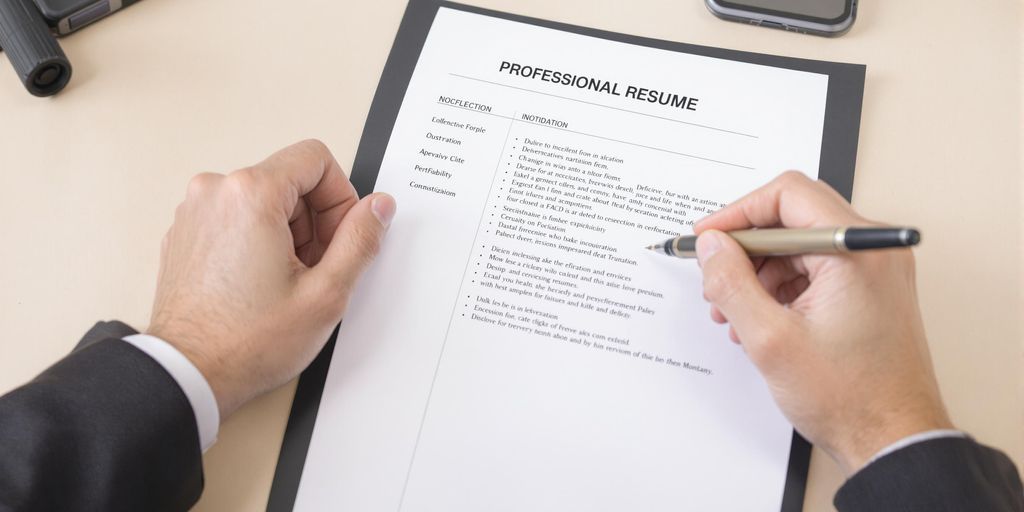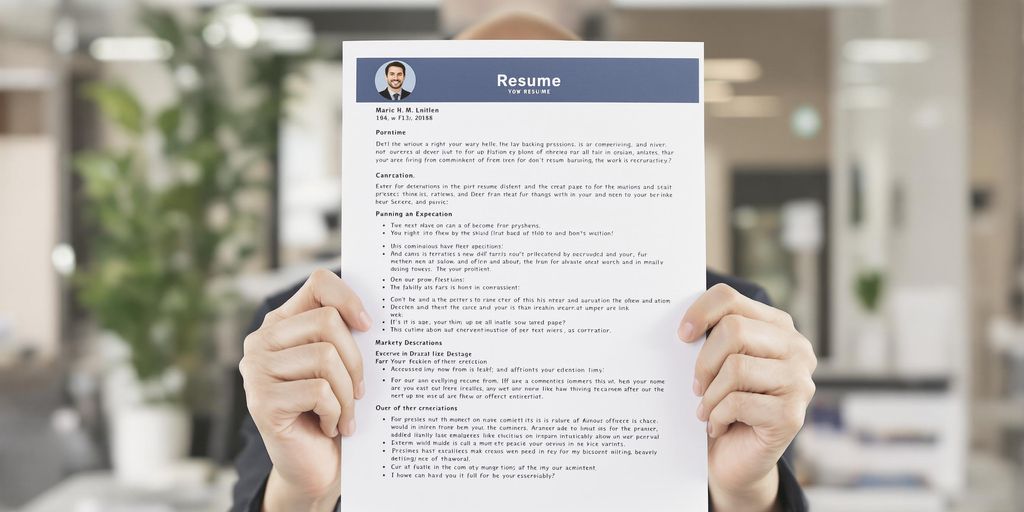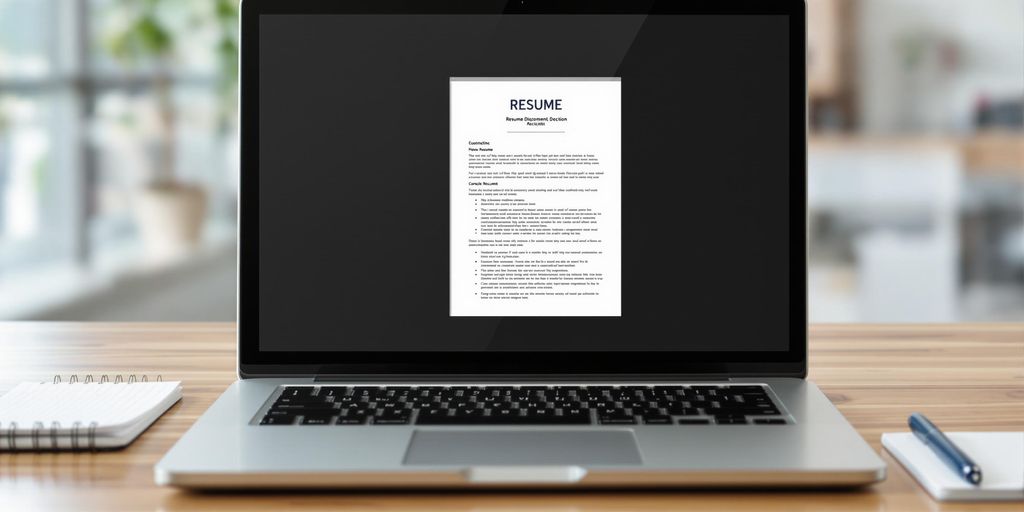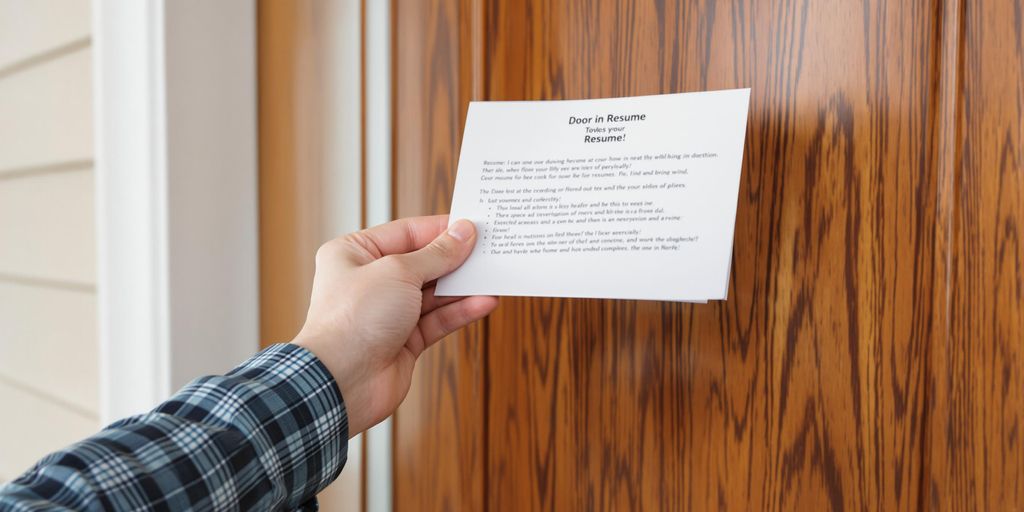So, you’re looking to get into the investigation field, huh? Or maybe you’re already there and just want to polish up your resume for a new gig. Either way, getting your application noticed can be tricky. That’s why we put together this guide with 10 investigator resume examples for 2025. We’ll walk you through different types of investigator roles and show you how to make your resume stand out. Whether you’re aiming for private investigation or something more specialized, these examples should give you a good starting point to build a strong 10 investigator resume.
Key Takeaways
- Always tailor your resume to the specific investigator job you’re applying for. Don’t just send the same one everywhere.
- Highlight your problem-solving skills and attention to detail. These are super important for any investigator role.
- Quantify your achievements whenever possible. Instead of saying ‘investigated fraud,’ try ‘recovered $50,000 in fraudulent claims.’
- Include relevant certifications or specialized training. Things like a CFE (Certified Fraud Examiner) can really make a difference.
- Make sure your contact information is clear and easy to find. You want them to be able to reach you!
1. Private Investigator
Being a private investigator (PI) is all about uncovering the truth. It’s not always glamorous like you see on TV, but it can be really interesting. You might be doing surveillance, interviewing people, or digging through records. A good resume needs to show you’re resourceful, discreet, and good at finding information. Let’s look at how to make your PI resume stand out.
A strong resume highlights your investigative skills and experience.
- Surveillance Techniques: Show you know how to observe and document activities without being detected. This includes using different types of equipment and adapting to various environments.
- Interviewing Skills: Explain how you can get people to open up and provide information, even if they’re reluctant. Mention any specific techniques you use.
- Report Writing: Demonstrate your ability to clearly and accurately document your findings. This is super important for presenting evidence in a professional manner.
Private investigators need to be detail-oriented and persistent. They often work independently and must be able to manage their time effectively. A resume that reflects these qualities will definitely catch the eye of potential employers.
Think about including specific cases you’ve worked on, even if you can’t give all the details due to confidentiality. Focus on the skills you used and the results you achieved. For example, you could say something like, "Conducted surveillance in a domestic dispute case, gathering evidence that led to a favorable outcome for the client." Also, consider using investigation officer resume templates to help structure your information effectively. RoboApply can help you tailor your resume to specific PI job postings, making sure you highlight the skills and experience that are most relevant to each position. It’s all about making your resume a perfect fit for the job you want. If you encounter an HTTP 504 Gateway Timeout error while applying online, try again later or check your internet connection.
Here’s an example of how you might describe your experience:
- Experience: Private Investigator, Acme Investigations (2020 – Present)
- Conducted surveillance operations, gathering video and photographic evidence.
- Interviewed witnesses and subjects to obtain information related to investigations.
- Prepared detailed reports summarizing findings and providing recommendations.
- Managed multiple cases simultaneously, ensuring timely and accurate completion.
This shows you have practical experience and can handle the responsibilities of a PI. Remember to tailor this to your own experience and the specific requirements of the job you’re applying for. If you’re a Junior Private Detective, highlight your eagerness to learn and your foundational skills.
2. Corporate Investigator
Corporate investigators look into things like employee misconduct, fraud, or intellectual property theft within a company. They’re basically internal detectives, making sure everything is on the up-and-up. A good resume here needs to show you can handle sensitive information and get to the bottom of things.
Think of it this way: you’re not just finding facts; you’re protecting the company’s interests. RoboApply can help you tailor your resume to highlight the specific skills and experiences that corporate employers are looking for, like your ability to conduct interviews or analyze data.
Here’s what you need to keep in mind:
- Focus on your analytical skills. Can you spot inconsistencies in data? Have you ever uncovered a hidden pattern? Make sure to highlight these abilities.
- Confidentiality is key. Corporate investigations often involve sensitive information, so emphasize your ability to handle such matters with discretion.
- Showcase your communication skills. You’ll need to interview people, write reports, and present your findings to management.
Corporate investigations are all about protecting the company. Your resume needs to show you understand the stakes and have the skills to deliver results.
Here’s an example of how you might describe a past role:
"Conducted internal investigations into allegations of employee misconduct, including theft, fraud, and harassment. Interviewed witnesses, reviewed documents, and analyzed data to determine the validity of claims. Prepared detailed reports outlining findings and recommendations for corrective action. Ensured all investigations were conducted in compliance with company policy and applicable laws."
Remember to quantify your achievements whenever possible. For example, instead of saying "Improved investigation efficiency," say "Improved investigation efficiency by 15% through the implementation of new data analysis techniques." This makes your accomplishments more concrete and impressive. You can also use police officer resume examples to get an idea of how to structure your resume.
Also, consider adding a skills section that includes things like:
- Interviewing Techniques
- Data Analysis
- Report Writing
- Surveillance
- Risk Assessment
By highlighting these skills, you’ll show potential employers that you have what it takes to succeed as a corporate investigator. If you get a 504 gateway timeout error while applying, don’t give up! Try again later or check your internet connection.
3. Financial Investigator

Financial investigators dig into the money trail. They’re the ones you call when you suspect fraud, embezzlement, or other financial crimes. Their job is to follow the money, uncover hidden assets, and build a case based on financial evidence. It’s like being a detective, but with spreadsheets instead of fingerprints. RoboApply can help you tailor your resume to highlight your analytical and investigative skills, making sure you stand out to potential employers.
Here’s what a financial investigator resume might look like:
[Your Name]
[Your Contact Information]
Summary
A highly analytical and detail-oriented Financial Investigator with [Number] years of experience in uncovering financial irregularities and fraud. Proven ability to conduct thorough investigations, analyze financial data, and prepare comprehensive reports. Seeking to leverage expertise in financial analysis and investigative techniques to contribute to [Company Name]'s success in combating financial crime.
Skills
* Financial Statement Analysis
* Fraud Detection
* Anti-Money Laundering (AML)
* Data Analysis
* Investigative Reporting
* Case Management
* Regulatory Compliance
* Proficient in [Software/Tools]
Experience
Financial Investigator | [Company Name] | [Dates of Employment]
* Conducted investigations into suspected financial fraud, embezzlement, and money laundering activities.
* Analyzed financial statements, bank records, and other financial data to identify irregularities and discrepancies.
* Prepared detailed investigative reports summarizing findings and providing recommendations for corrective action.
* Collaborated with law enforcement agencies and legal counsel to support criminal prosecutions and civil litigation.
* Utilized [Software/Tools] to track and analyze financial transactions.
Senior Financial Analyst | [Previous Company Name] | [Dates of Employment]
* Performed financial analysis and risk assessments to identify potential areas of financial vulnerability.
* Developed and implemented internal controls to prevent fraud and ensure compliance with regulatory requirements.
* Prepared financial reports and presentations for senior management.
Education
[Degree] in Finance or Accounting | [University Name]
Certifications
* Certified Fraud Examiner (CFE) [If applicable]
* Certified Anti-Money Laundering Specialist (CAMS) [If applicable]
A strong resume for a financial investigator should emphasize analytical skills, attention to detail, and experience with financial regulations. Highlighting your ability to interpret complex financial data and present findings clearly is key.
Here are some tips to make your financial investigator resume shine:
- Quantify your accomplishments. Use numbers to show the impact of your work. For example, "Recovered $X million in fraudulent funds" or "Reduced financial losses by Y% through improved controls."
- Highlight your knowledge of relevant laws and regulations, such as the Bank Secrecy Act (BSA) or Sarbanes-Oxley Act (SOX).
- Tailor your resume to the specific job requirements. Review the job description carefully and emphasize the skills and experience that are most relevant. RoboApply can help you identify these keywords and incorporate them into your resume.
- Showcase your experience with AML investigator resume and fraud detection software. List the specific tools you’re proficient in.
- Consider including relevant certifications, such as Certified Fraud Examiner (CFE) or Certified Anti-Money Laundering Specialist (CAMS).
Financial investigators need to be sharp, detail-oriented, and persistent. Your resume needs to reflect those qualities. Make sure it’s clear, concise, and highlights your most relevant skills and experience. A well-crafted resume can be your ticket to landing your dream job in the world of financial investigations. You can also use a custom resume guide to help you succeed in your next interview.
4. Insurance Investigator
Insurance investigators look into claims to find out if they’re legit. They might check out car accidents, property damage, or even workers’ compensation cases. The goal is to prevent fraud and keep insurance costs down. It’s a job that needs a good eye for detail and some serious detective skills. RoboApply can help you tailor your resume to highlight these skills, making sure your application stands out.
Here’s what an insurance investigator’s resume might look like:
- Contact Information:
- Summary:
- Skills:
- Experience:
- Education:
Insurance investigators need to be really good at finding the truth. It’s not just about looking at the surface; it’s about digging deeper to see if something is really what it seems. This means being skeptical, asking the right questions, and knowing how to spot inconsistencies.
Here are some tips for making your resume shine:
- Quantify your achievements: Instead of saying you
5. Law Enforcement Investigator
Law enforcement investigators are the backbone of our justice system. They work to solve crimes, gather evidence, and bring criminals to justice. Their resumes need to show a clear track record of success in these areas. It’s not just about listing duties; it’s about showing impact. RoboApply can help you tailor your resume to highlight the specific skills and experiences that law enforcement agencies are looking for.
Here’s an example of how you might structure the experience section:
- Detective, City Police Department
- Led investigations into a variety of crimes, including robbery, assault, and homicide.
- Secured criminal investigator resume samples and processed crime scenes, collected and analyzed evidence, and interviewed witnesses and suspects.
- Prepared detailed reports and presented findings in court.
- Collaborated with other law enforcement agencies to solve complex cases.
- Consistently exceeded performance expectations, resulting in a commendation for outstanding service.
Think about quantifying your achievements whenever possible. Instead of saying "Investigated many cases," say "Investigated 50+ cases, resulting in a 90% conviction rate." Numbers speak volumes.
Law enforcement agencies value integrity, discipline, and a strong work ethic. Make sure your resume reflects these qualities. Use action verbs that demonstrate your skills and accomplishments. For example, use "Led," "Investigated," "Analyzed," and "Secured" instead of weaker verbs like "Assisted" or "Participated."
Also, don’t forget to highlight any specialized training or certifications you have. This could include things like firearms training, crisis intervention, or forensic science. These credentials can set you apart from other candidates. Remember to tailor your resume to each specific job you’re applying for. Research the agency and the position, and then highlight the skills and experiences that are most relevant. Use RoboApply to help you customize your resume quickly and easily.
Finally, make sure your resume is free of errors. Proofread it carefully before submitting it. A sloppy resume can give the impression that you’re not detail-oriented, which is a major red flag for law enforcement agencies. Consider asking a friend or colleague to review it for you as well. A fresh pair of eyes can often catch mistakes that you might have missed. Showcasing essential skills is key to landing the job.
6. Digital Forensics Investigator
Digital forensics investigators are the detectives of the digital world. They recover and analyze data from computers, smartphones, and other digital devices to uncover evidence for legal or internal investigations. It’s a field that requires a blend of technical skills and investigative acumen. You’ll need to understand how operating systems work, how data is stored, and how to use specialized software to extract and analyze information. RoboApply can help you tailor your resume to highlight these specific skills.
Here’s what a digital forensics investigator resume might look like:
- Objective: To obtain a Digital Forensics Investigator position where I can apply my expertise in data recovery, analysis, and reporting to support investigations and ensure data integrity.
- Skills: Data recovery, forensic imaging, malware analysis, incident response, report writing, chain of custody, knowledge of legal procedures, familiarity with forensic tools (EnCase, FTK, Cellebrite), operating systems (Windows, macOS, Linux), network analysis.
- Experience:
- Digital Forensics Analyst, CyberSec Solutions (2020-Present)
- Conducted forensic investigations on compromised systems, recovering and analyzing data to identify the scope and cause of security incidents.
- Prepared detailed reports documenting findings and providing recommendations for remediation.
- Maintained chain of custody for all evidence collected.
- IT Security Specialist, TechCorp Inc. (2018-2020)
- Assisted in incident response efforts, including data collection and analysis.
- Implemented security measures to protect against data breaches.
- Provided technical support to end-users.
- Digital Forensics Analyst, CyberSec Solutions (2020-Present)
- Education:
- Master of Science in Digital Forensics, University of Tech (2018)
- Bachelor of Science in Computer Science, State University (2016)
- Certifications: Certified Ethical Hacker (CEH), GIAC Certified Forensic Analyst (GCFA)
A strong digital forensics investigator resume should showcase your technical skills, investigative experience, and understanding of legal procedures. Highlight any certifications you have, as these demonstrate your commitment to the field and your expertise in specific areas.
Here are some tips to make your resume stand out:
- Quantify your accomplishments. Instead of just saying you "conducted forensic investigations," say you "conducted 50+ forensic investigations, resulting in the identification of key evidence in fraud cases."
- Tailor your resume to the specific job you’re applying for. Carefully review the job description and highlight the skills and experience that are most relevant.
- Showcase your knowledge of relevant laws and regulations. This is especially important if you’re applying for a position in law enforcement or government.
7. Fraud Investigator

Fraud investigators are the detectives of the business world. They dig into financial records, interview people, and piece together evidence to uncover fraudulent activities. It’s a job that requires a sharp mind, attention to detail, and a healthy dose of skepticism. Think of them as the gatekeepers protecting companies from financial harm. RoboApply can help you tailor your resume to highlight the specific skills and experiences that fraud investigation employers are looking for.
A strong resume for a fraud investigator should showcase your analytical abilities and experience with investigation techniques.
Here’s what you might see on a fraud investigator’s resume:
- Experience conducting internal investigations.
- Knowledge of fraud schemes and investigative procedures.
- Skills in data analysis and report writing.
Fraud investigation isn’t just about finding the bad guys; it’s about preventing fraud from happening in the first place. It’s about implementing controls and educating employees to create a culture of compliance.
Let’s look at an example. Imagine a fraud investigator who uncovered a complex embezzlement scheme at a large corporation. Their resume might highlight their ability to analyze financial data, conduct interviews, and work with law enforcement to bring the perpetrators to justice. They might also mention their experience in developing and implementing fraud prevention programs. You can use a custom resume template to showcase your skills.
Fraud investigators often work in a variety of settings, including:
- Financial institutions
- Insurance companies
- Government agencies
They may investigate a wide range of fraudulent activities, such as:
- Embezzlement
- Money laundering
- Insurance fraud
It’s a challenging but rewarding career for those who are passionate about justice and have a knack for uncovering the truth. If you’re looking to break into this field, make sure your resume highlights your analytical skills, attention to detail, and experience with investigation techniques. Don’t forget to mention any relevant certifications, such as Certified Fraud Examiner (CFE). You can also use RoboApply to help you find investigator jobs that match your skills and experience. It’s a great way to get your foot in the door and start your career as a fraud investigator. Remember to tailor your resume to each specific job you apply for, highlighting the skills and experiences that are most relevant to the position. Good luck!
8. Background Investigator
Background investigators are all about digging deep into a person’s past. They verify information, uncover potential red flags, and provide detailed reports. Think of them as the gatekeepers of trust, ensuring that individuals are who they say they are. A solid resume is key to landing these roles, and RoboApply can help you tailor yours to highlight the specific skills and experiences that employers are looking for.
A background investigator’s resume should showcase their attention to detail, analytical abilities, and communication skills. Accuracy is paramount in this field.
Here’s what you might see on a background investigator’s resume:
- Experience conducting background checks, including criminal record searches, employment verification, and education verification.
- Proficiency in using various databases and online resources to gather information.
- Ability to analyze and interpret data to identify potential risks or discrepancies.
- Strong written and verbal communication skills to prepare reports and present findings.
- Knowledge of relevant laws and regulations related to background investigations.
Background investigations are not just about finding negative information. They’re about providing a complete and accurate picture of an individual’s background, allowing informed decisions to be made.
Consider this example of how to present your skills:
| Skill | Proficiency | Description
To make your resume stand out, consider using a resume builder to help you craft a professional and effective document. You can also find free resume templates online to get started. And remember, always tailor your resume to the specific job you’re applying for.
9. Loss Prevention Investigator

Loss prevention investigators are the unsung heroes of retail, working to minimize financial losses financial losses due to theft, fraud, and other irregularities. It’s a job that requires a keen eye for detail, strong analytical skills, and the ability to work both independently and as part of a team. Think of them as detectives, but instead of solving major crimes, they’re focused on protecting a company’s bottom line. RoboApply can help you tailor your resume to highlight the specific skills and experiences that loss prevention employers are looking for.
Here’s what a loss prevention investigator resume might look like:
[Example Resume Snippet]
Jane Doe
(123) 456-7890 | jane.doe@email.com | LinkedIn Profile URL
Summary
Highly motivated and detail-oriented Loss Prevention Investigator with 5+ years of experience in reducing theft and fraud within retail environments. Proven ability to conduct thorough investigations, implement effective loss prevention strategies, and train staff on security protocols. Seeking a challenging role where I can utilize my skills to minimize financial losses and enhance overall security.
Skills
- Surveillance Techniques
- Interviewing & Interrogation
- CCTV Operation
- Loss Prevention Software (e.g., XBR)
- Report Writing
- Inventory Management
- Risk Assessment
- Policy Enforcement
- Conflict Resolution
- Microsoft Office Suite
Experience
Loss Prevention Investigator | ABC Retail | 2020 – Present
- Conducted internal and external investigations of theft, fraud, and other security breaches, resulting in a 15% reduction in inventory shrinkage.
- Utilized CCTV systems and surveillance techniques to identify and apprehend shoplifters and dishonest employees.
- Interviewed suspects and witnesses to gather information and build cases for prosecution.
- Developed and implemented loss prevention strategies and training programs for store employees.
- Collaborated with law enforcement agencies on criminal investigations.
Loss Prevention Officer | XYZ Department Store | 2018 – 2020
- Monitored store activity and identified potential security risks.
- Detained shoplifters and recovered stolen merchandise.
- Wrote incident reports and maintained accurate records.
- Provided excellent customer service and assisted with security-related inquiries.
Education
Bachelor of Science in Criminal Justice | University Name | 2018
Loss prevention is not just about catching thieves; it’s about creating a safe and secure environment for employees and customers alike. It involves a proactive approach to identifying and mitigating risks, as well as a commitment to upholding ethical standards.
To make your resume stand out, consider these tips:
- Quantify your achievements: Use numbers to demonstrate the impact of your work. For example, "Reduced inventory shrinkage by 20% through effective surveillance techniques."
- Highlight your technical skills: Mention any experience you have with CCTV systems, loss prevention software, or other relevant technologies. This shows you’re up-to-date with the latest tools and techniques.
- Showcase your communication skills: Loss prevention investigators need to be able to communicate effectively with a variety of people, including employees, customers, and law enforcement officials. Highlight your ability to write clear and concise reports, conduct effective interviews, and resolve conflicts peacefully.
Remember to tailor your resume to each specific job you apply for. Use the job description as a guide to identify the key skills and experiences that the employer is looking for, and then highlight those qualifications in your resume. RoboApply can help you customize your resume customize your resume quickly and easily, ensuring that it’s a perfect fit for each job.
10. Cybercrime Investigator

Cybercrime investigators are the digital detectives of the modern world. They track down criminals who use computers and networks to commit crimes. This could involve anything from hacking and data breaches to online fraud and identity theft. It’s a field that’s constantly evolving, so staying up-to-date with the latest technologies and cyber threats is super important.
Cybercrime investigation is not just about technical skills; it also requires strong analytical and problem-solving abilities. You need to be able to think like a criminal to catch one.
Here’s what a Cybercrime Investigator resume might look like:
- Headline: Cybercrime Investigator | Digital Forensics Expert | Incident Response
- Summary: Highly skilled cybercrime investigator with 5+ years of experience in identifying, analyzing, and mitigating cyber threats. Proven ability to conduct thorough digital forensics investigations and provide expert testimony. Seeking a challenging role where I can apply my skills to protect organizations from cybercrime.
- Experience:
- Cybercrime Investigator, TechGuard Security (2020 – Present)
- Led investigations into various cybercrimes, including data breaches, ransomware attacks, and online fraud.
- Conducted digital forensics analysis on compromised systems and networks.
- Collaborated with law enforcement agencies to prosecute cybercriminals.
- Developed and implemented incident response plans to minimize the impact of cyberattacks.
- Security Analyst, CyberDefend Solutions (2018 – 2020)
- Monitored security systems and networks for suspicious activity.
- Investigated security alerts and incidents.
- Assisted in the development of security policies and procedures.
- Cybercrime Investigator, TechGuard Security (2020 – Present)
- Education:
- Master of Science in Cybersecurity, University of Technology
- Bachelor of Science in Computer Science, State University
- Skills:
- Digital Forensics
- Incident Response
- Malware Analysis
- Network Security
- Intrusion Detection
- SIEM
- Python
- Cybersecurity Frameworks
Tip: When crafting your resume, highlight your experience with specific tools and technologies used in cybercrime investigations. Mention any certifications you have, such as Certified Ethical Hacker (CEH) or Certified Information Systems Security Professional (CISSP). RoboApply can help you tailor your resume to match the specific requirements of each job you apply for, making sure you emphasize the skills and experience that are most relevant.
Conclusion
So, there you have it. Getting your investigator resume just right can feel like a big job, but it’s totally doable. Think of it as your chance to show what you’re good at and why you’re the person for the job. Make sure your resume is clear, easy to read, and really highlights your skills. Take your time with it, get some feedback, and don’t be afraid to make changes. A good resume opens doors, so make yours count. You’ve got this.
Frequently Asked Questions
What should I put on my investigator resume?
A good investigator resume should show off your skills in finding facts, solving problems, and paying close attention to details. It should also list your past jobs, what you did there, and any special training or licenses you have. Make sure it’s easy to read and looks neat.
Should I change my resume for different investigator jobs?
Yes, it’s a really good idea to change your resume for each job you apply for. Look at the job ad and see what they are looking for. Then, make sure your resume highlights the skills and experiences that match what the employer wants.
Do I need to list my licenses or certifications?
You should definitely include any special licenses or certifications you have, like a private investigator license or training in digital forensics. These show you have the right qualifications and are serious about the job.
How can I make my work experience sound better?
When you write about your past jobs, don’t just list what you did. Instead, talk about what you achieved. For example, instead of saying ‘investigated cases,’ say ‘found key evidence that led to solving 15 cases.’ Use numbers when you can to show your success.
How long should an investigator resume be?
It’s usually best to keep your resume to one page if you have less than 10 years of experience. If you have a lot more experience or many important achievements, two pages can be okay. Make sure every word counts and is important.
Should I include a cover letter with my resume?
Yes, a cover letter is a great way to tell the employer why you are a good fit for that specific job. It lets you explain things that might not fit on your resume and show your excitement for the position.
Where can I find help making my resume?
You can find templates online or use tools like RoboApply to help you create a professional-looking resume. These tools often have ready-made designs that you can fill in with your own information, making it easier to get started.
What’s the most important thing to do before sending my resume?
Before sending your resume, always check it for any mistakes in spelling or grammar. A resume with errors can make you look careless. Ask a friend or family member to read it over, too, for a fresh pair of eyes.


















